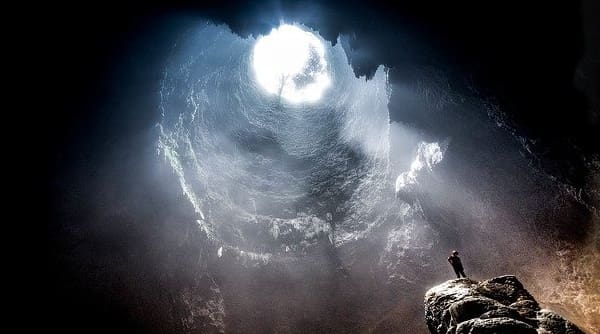Do you enjoy being alone?
Many people’s favorite hobbies include time spent alone: curling up by the fire with a good novel, going for a long walk, building model trains, cooking a gourmet meal, or entering into the silence of prayer.
For me personally, hours or days spent alone have been some of the best and some of the worst moments of my life.
I’ve had profound experiences of peace, joy, or even exhilaration amidst solitude: making a 30-day Ignatian retreat, stumbling on deeper truths while researching or writing, hiking up a mountain in Scotland, or walking on a 120-mile pilgrimage. Each of those experiences was challenging, even demanding – but always rewarding in the end. They yielded personal growth and left me feeling more fully alive, more truly human, and more truly myself.
I’ve also spent many thousands of hours of my life in self-isolating and fruitless pursuits. They gave a momentary reprieve from my burdens but left me feeling empty and disconnected. In my adolescent years, it was endless hours of video games. Later in life, it was time wasted on the internet, creature comforts like food and drink, or long hours spent being busy, working and toiling in the pursuit of “success” in a way that brought no real joy or peace, no lasting fruit.
Is it good to be alone?
Our Christian Faith offers both sides of the coin. On the one side, “It is not good for man to be alone” (Genesis 2:18). We are made for communion – with God, with others, with ourselves. Sin is a rupture of that communion. As a consequence of that rupture, isolation and loneliness become truly hellish experiences. Indeed, authors like C.S. Lewis (in The Great Divorce) or his friend Charles Williams (in The Descent into Hell) have offered chilling literary depictions of how those who “go to Hell” begin the experience of isolation and alienation and misery here and now. On the positive side of the “alone” coin, we see Jesus spending long hours in solitude, whether fasting for forty days in the desert or spending the whole night in prayer. We see godly men like Benedict or Anthony of the Desert spending entire years in solitude and bearing abundant fruit in the lives of others.
There is an important distinction between solitude and isolation. The one actually connects us with God and others and self, heals us, refreshes us, restores us to communion, and bears much fruit. The other isolates and ruins and rots, becoming a foretaste of Hell.
To turn to movie imagery, we can contrast the “Fortress of Solitude” in Superman with Elsa’s ice palace in Frozen. Superman withdraws into his fortress to reconnect with his roots, to think and meditate, and ultimately to re-emerge with clarity of vision and an eagerness to serve. Elsa spends years trapped in isolation until her heart finally melts, and she re-discovers the beauty of vulnerability, communion, and love.
I find the story of Saint Benedict especially captivating. His three years of solitude in the cave at Subiaco changed his life. It set the stage for him to find true peace in healthy relationships with God, others, and self. The Benedictine way of life went on to have a 1,000-year impact on Europe and ultimately on the United States. Thanks to the monks, the wisdom of the ancients was saved and preserved; barbarian tribes became civilized Christian peoples; universities and human learning flourished; lasting and stable democracies emerged.
I remember my pilgrimage to Subiaco in 2012, kneeling in that cave and pondering how many millions of lives were impacted because of one man’s fruitful solitude in that place. I love the description written a century later by Gregory the Great: “Then he returned to his place of beloved solitude, and was alone with himself in God’s sight.” This was no flight from reality into isolation, no numbing of emotional pain, or escape into fantasy. He abided in God’s presence, and he abided “with himself.” It was a spiritual battle that God helped him to win. The end result was a superabundant fruitfulness when he lived in community with others.
Authentic solitude is an essential part of the human experience – whether we are introverts or extroverts! Only when we have periods of silence and solitude can we get in touch with our deepest desires and deepest fears.
Indeed, solitude is a chance to face our loneliness rather than flee from it. We experience loneliness by feeling overwhelmed and unsupported in a new and scary situation, feeling misunderstood or unappreciated, feeling excluded or rejected or left out.
I have felt all of those things in my own life. It is painful. I spent far too many moments in my life trying to self-isolate or numb my pain. A wise man that I know likes to say, “isolation is the first drug.” Different people turn to different drugs: gambling, marijuana, pornography, sexual affairs, food, alcohol, shopping, etc. Each is ultimately an attempt to isolate and escape, to distract and divert, a flight from communion with God, running away in shame and self-disgust, rather than facing the messiness of our heart.
It doesn’t have to be that way. God made our hearts and made them good and beautiful. We are beloved sons and daughters of God, and profoundly connected with the other members of the Body of Christ – both those still fighting here on earth and those already victorious in heaven. We are never truly alone. Authentic experiences of solitude serve to heal and restore our communion with God and others and self. They help us abide in love and truth and to bear fruit.




